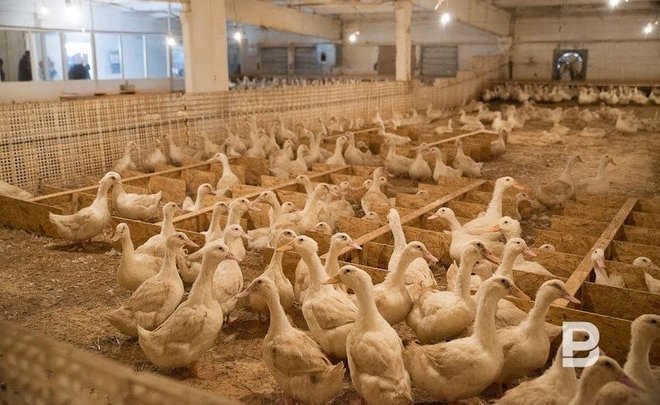Tatarstan 'encircled' by cases of avian flu and African plague next door

Tatarstan, having become a large transshipment point of the Volga Federal District for sellers of livestock products, has found itself in a special risk zone for the spread of both avian influenza and African swine fever. At the same time, the situation is not easy compared to 2020: the same swine fever has already “surrounded” Tatarstan, and the last case of avian flu occurred in Bashkortostan just 35 km from the Utazinsky district. Anxiety is also added by the fact that a human in 2021 was infected with avian flu for the first time — so far, however, only in China. About how Tatarstan veterinarians and Rosselkhoznadzor specialists are resisting virus attacks and how the Russian strain of avian flu differs from the Chinese one — read in the material of Realnoe Vremya.
Tatarstan is a large distribution centre of the Volga Federal District, and therefore is in a special risk zone
Tatarstan is in a specific risk zone during the autumn season, when infectious diseases are especially dangerous for farm animals and poultry, in particular avian influenza and African swine fever. This is due to that the republic is currently a large distribution centre, where large volumes of slaughtered animals and birds first go and then are distributed to the Volga regions.

This year, Tatarstan veterinarians have recorded plague pig products of Belgorod production. In 2019-2020, “influenza” poultry from Rostov and Perm were brought to the republic. They try to monitor livestock imports and exports: veterinarians coordinate each case with the counterparty. The fact of well-being or disadvantage of a region or a farm from where the products are imported is taken into account.
“Compared to last year, the situation is not easy”
The year 2021 has become especially unfavourable for the Russian agro-industrial complex for the spread of African swine fever, which is considered a dangerous disease. The problem is aggravated by 100% mortality, the lack of a vaccine, prevention and treatment, as well as the resistance of the virus in the external environment. Today, the products of infected pigs have already reached large retail chains of Russian regions — until now, the virus was spreading through large agricultural enterprises, farms and personal subsidiary farms.
“Compared to last year, the situation is not easy. Since the beginning of the year, 215 cases of African swine fever have already been recorded, 70 of them are wild fauna (i.e. wild boars), 145 are domestic animals. Quarantine has already been declared for 84 foci of spread, including 70 foci of domestic pig disease," Almaz Khisamutdinov said. “Every month we take about a thousand samples in retail chains, check them in federal and republican laboratories.”
Tatarstan is at risk: cases of African plague have been recorded in the neighbouring Nizhny Novgorod Oblast and Samara Oblast, as well as in Perm Krai and Saratov Oblast. Close contacts with the virus are also possible due to the supply of pig products to Tatarstan. The veterinarians of the Republic of Tatarstan and Rosselkhoznadzor are now working particularly closely with large agricultural firms, which regularly receive orders to eliminate violations.
All producers of agricultural firms are divided according to the so-called “compartmentalisation” — it determines the level of protection of farms from the penetration of pathogens of particularly dangerous infectious diseases:
- compartment I — farms unprotected from threats;
- compartment II — low-level protection farms;
- compartment III — medium-level protection farms;
- compartment IV — farms of a high level of protection.
So far, there are farms of both the fourth and the first type in the Republic of Tatarstan. In total, there are half a million pigs in Tatarstan.
The last case of avian flu occurred in Bashkiria, 35 km from the Utazinsky district
But if it is possible to control large agricultural companies, then personal subsidiary farms remain in the gray zone, which Almaz Khisamutdinov called a “problematic industry”. Subsidiary farms also hasveno division by compartments. As a result, some farms keep pigs openly — which often leads to contact with wild boars and, as a result, to infection.
“Rosselkhoznadzor identifies such farms, the veterinary service fines them, but we still have this. If you decide to keep pigs at home— you need to maintain the maximum closed mode! But pigs sometimes walk in our street, in the forest. These cases are 20-30% of the spread," said the head of the Veterinary Department of the Cabinet of Ministers of the Republic of Tatarstan, stating that since the beginning of the year more than 4,000 wild boars have been shot, which there are still being a lot in Tatarstan.
At the same time, veterinarians are trying to prevent the spread of avian influenza in the Republic of Tatarstan, and it is also especially difficult to do this, because Tatarstan is not only a livestock region.
“We have a lot of distribution centres. Poultry is distributed through them. A very large number of poultry products come to us. We take each batch and check it in the laboratory. A huge job and, by the way, expensive. It happens, sometimes there are infected products," admitted the chief veterinarian of the Republic of Tatarstan.
Bird flu has also actually “surrounded” Tatarstan: cases of infection have already been recorded in Samara Oblast, Saratov Oblast, Bashkiria, Orenburg Oblast — 22 in total in 12 regions. The last case of avian flu occurred in Bashkiria, 35 km from the Utazinsky district.
But the source of the spread of avian influenza is often migratory birds resting during a flight to warmer climes on Tatarstan reservoirs. Despite the bitter experience of the previous year, when the Buinsky, Drozhzhanovsky, Zelenodolsky and Muslyumovsky districts of Tatarstan suffered from infection, many farms and private farms continue to keep their poultry free, allowing it to swim in reservoirs, which should not be done in autumn. Today, about 1,5 million birds are kept in private farms — another 13,5 million in large agricultural firms and farms. As in the beginning of autumn, veterinarians persistently suggest that a bird that has “reached the condition” should be slaughtered immediately — “it's better than burning all the livestock later” — and keep it in freezers.
A human in 2021 has been infected with avian flu for the first time — only in China so far
“Now there are fewer cases when domestic geese and ducks swim in reservoirs, of course. But there is a very large livestock in the Republic of Tatarstan! Geese are everywhere, living creatures swim in reservoirs if you travel around the districts. There are enough birds on the village streets!” Khisamutdinov confessed. “However, the Muslyumovsky district is the most poultry-breeding in our country, there are also about 5 million poultry, and we just went there yesterday: we no longer saw birds on the streets and on reservoirs. People understand. Because in 2020, up to 5,000 geese had to be burned in one place!”
At the same time, neither veterinarians nor Rosselkhoznadzor have the right to punish negligent owners for poultry swimming in reservoirs in any way — and only a “small fine” is due for open keeping of pigs. The chief veterinarian of the Republic of Tatarstan also commented on the possibility of human infection with avian flu. According to Almaz Khisamutdinov, for the first time such case has been recorded this year, and again in China.
“It happened at the end of April 2021, but there was no fatal accident. A person became infected with avian influenza from a strain of the H10N3 virus, which has not yet been detected in Russia. Avian influenza with the H5N8 strain is now spreading in Russia. There were many contacts of people with sick birds infected with this strain... Transmission of avian influenza virus to humans has not been detected in Russia. It's too early to be afraid. But all the same, when detecting any bird flu virus, we definitely use both respirators and gloves!” the chief veterinarian declared.